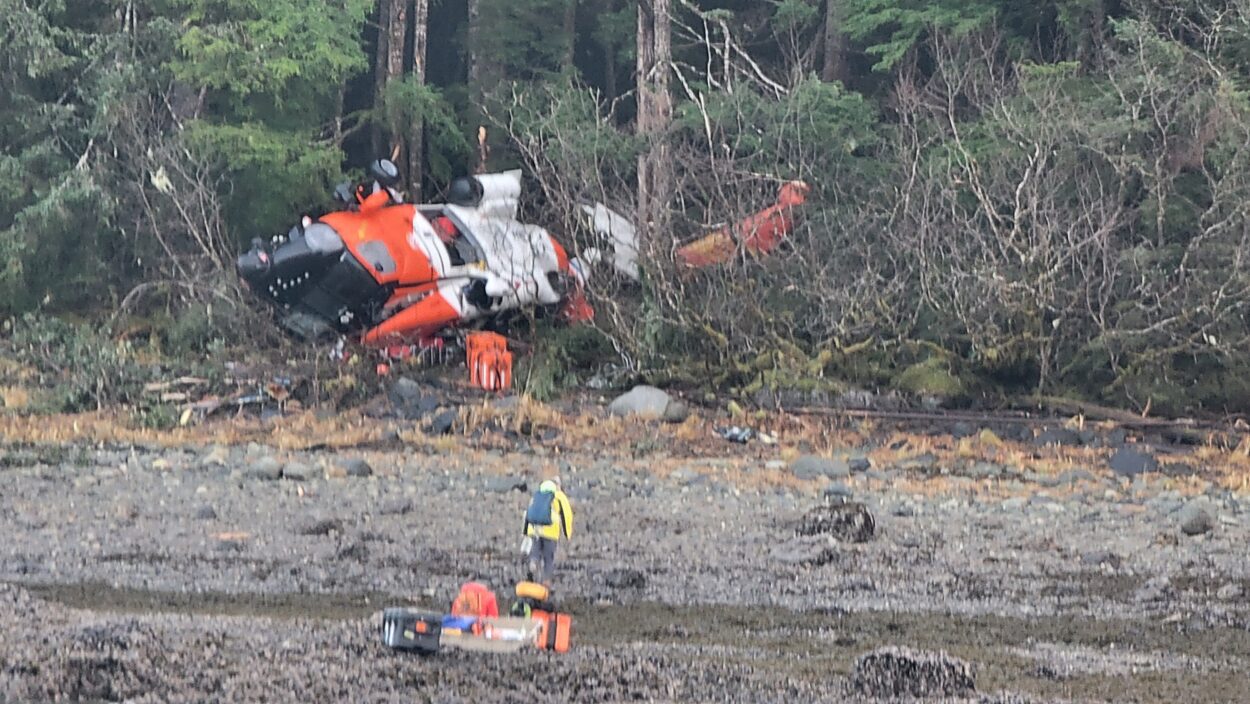
(Photo courtesy of Aaron Hankins)
A U.S. Coast Guard Jayhawk helicopter crashed on the night of November 13th on a remote island northwest of Petersburg. There were four crew members aboard, and all survived — though two were seriously injured. They’d flown out to the island to render aid to a crabbing boat that was taking on water.
But as KFSK’s Shelby Herbert reports, the people they came to rescue became their rescuers instead.
The crew of the Jayhawk helicopter were on their way from Air Station Sitka to assist a commercial crabbing vessel, which was taking on water near Farragut Bay. When they arrived, the crew of the boat had just begun to contain the flooding. But then things went south for the helicopter — it crashed on the island, landing completely upside down.
The crew of the Lydia Marie — brothers Logan and Levi Padgett — jumped into the fray. They went ashore and helped the crew call for help from Petersburg. Two members of the helicopter crew were pinned inside, and the brothers tried to keep them comfortable with sleeping bags and ibuprofen until more help arrived. Petersburg Search and Rescue, EMS, police, Alaska Wildlife Troopers, and more Coast Guard personnel answered their call for help.
Aaron Hankins is the director of Petersburg’s emergency services. He says the ride to Read Island was pretty treacherous — waves were nearly washing over the sides of the boat. And all the while, they were being pelted with snow and rain.
“We were kind of going with it on our way there and it was still pretty lumpy,” said Hankins. “It was pretty rough. At times, it was whiteout [conditions] on our way out there.”
Patrick Fowler leads Petersburg’s Search and Rescue team. He says when they reached the downed helicopter — a couple hours after the crash — they walked into a mess.
“[There was a] strong smell of fuel in the air, as could be expected,” said Fowler. “The helicopter was almost totally on its top side.”
The team was ready to render aid. But they didn’t have the right tools to immediately get the crew out of the fuselage. What they had with them might have been suitable to extract someone from a car accident — not a helicopter. But with time — and some brute force — they were able to free the injured crew.
”[It was] just a small space that’s gone topsy-turvy, and people kind of stuck and injured,” said Fowler. “It’s always a tricky environment to work in. And so yeah, cutting some straps, breaking a couple of pieces of metal and ultimately getting where we could transition them up and out of the helicopter.”
In spite of the challenges, Fowler said it was his favorite type of rescue mission.
“At the end of the day, everyone came home — and that’s why we do this,” said Fowler. “You see a direct correlation to your actions and a positive benefit to the people there that were in trouble. So that’s the most rewarding type of mission that we get.”
Back in Petersburg, Dr. Alice Hulebak was the physician on call that night. She says it was all hands on deck. Most of the hospital’s nurses and providers came out to lend a hand — even though they weren’t on call. Hulebak says the attending staff didn’t know what to expect — but they weren’t optimistic.
“There was a lot of unknown,” said Hulebak. “But [we were] sort of planning for, unfortunately, the worst. So that is why we essentially called in as much help as we could.”
Once the patients were stabilized, two nurses and a doctor accompanied the Coast Guard medevac flight to Seattle, because the Coast Guard didn’t have their own medevac team available at the time.
Mary Kravitz is Petersburg Medical Center’s nursing supervisor. She was on that flight, tending to the injured helicopter crew. She’s also the spouse of a Coast Guardsman. Kravitz says that connection made it very easy for her to volunteer her time.
“Thinking of my husband — it’s something that if I was in their shoes, and I couldn’t get to my husband in this sort of situation, I would hope that somebody would do the same for him,” said Kravitz.
The Coast Guard has not released the names of the crew members and their investigation into the cause of the crash is ongoing.
They’ve established a security zone extending two nautical miles out from Read Island while it investigates the crash. All vessels in the vicinity are required to stay clear of the island until January 14th, 2024. Any parties who wish to travel through the area must get permission from the Southeast Alaska Command Center by calling (907) 463-2980, or VHF channel 16.










